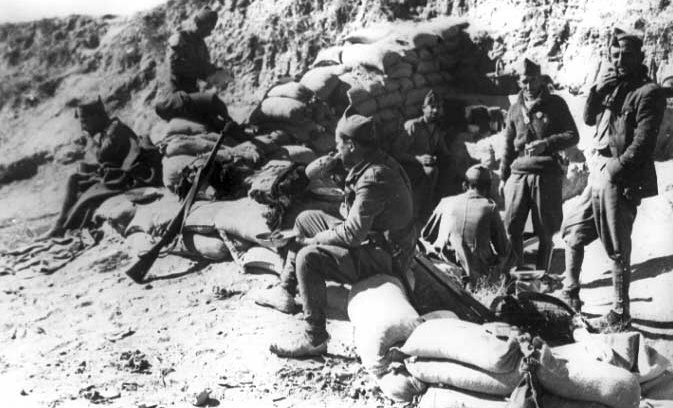The Spanish Civil War
The Spanish Civil War (July 1936-April 1939) began as a classic military coup against the leftist, democratically elected government of the Republic. Due to the persistent resistance of various workers' militias, the conflict degenerated into a full-fledged civil war. Spain was still in many ways a feudal country, although some regions such as Catalonia and the Basque Country had also experienced strong industrial development since the belle epoque. Many sharp contradictions tore the country apart. Left opposed right, centralists opposed regionalists, devout believers opposed freethinkers. But even within the major camps, especially within the left-Republican camp, factions stood with drawn knives against each other. In the nationalist camp, Generalissimo Franco succeeded more quickly in achieving unity. Despite initially losing the rich industrialized regions, he managed to resolve the exceptionally cruel fratricidal conflict in his favor after almost three years. His military superiority and the support he received from abroad were very important in this regard.
The Spanish Civil War acquired great symbolic value because of its European dimension. For many observers, World War II began in Spain. Franco enjoyed the support of the European dictatorships in full expansion, especially fascist Italy and Nazi Germany. The Republic could only count on effective military support from the Soviet Union and Mexico, but had to accept the increasing influence of the small Spanish Communist Party in return. The Western European democracies chose to remain neutral, despite their knowledge of Italian-German interference. Belgium followed this non-intervention policy closely.
When Madrid was on the verge of being lost to the Republic in November 1936, foreign volunteers came to the rescue. The International Brigades were a creation of the international communist movement (Komintern), in line with the Popular Front idea that sought to unite all forces against fascism. An estimated 35,000 'Interbrigadists' from around the world enlisted. Volunteers came from over 50 countries and represented a range of leftist political ideologies, the majority of them communists, but also socialists, anarchists and anti-fascists. Many volunteers were motivated by a desire to combat fascism and defend democracy, while others were driven by a sense of adventure or a range of personal motives. Despite their often limited military experience and skills, the Brigades were deployed as shock troops of the Republican army. The losses were therefore exceptionally high.

(Amsab-ISH fo000338).
Caudillo Franco ultimately won the civil war in February 1939. The volunteers of the Brigades were officially demobilized in November 1938. In their respective countries, they were often no longer admitted, sometimes persecuted, or at least mistrusted. Several years later, many of them participated in the resistance against the conquest wars that Hitler and Mussolini had launched in Europe. Then, and also in the decades after 1945, these wars and occupations were often seen from a national-patriotic perspective. Today, the anti-fascist view of World War II and, in particular, the universal significance of the Judeocide are central to our view of that period. From this perspective, the Spanish Civil War once again takes the prominent place it had already acquired for many in the 1930s.
